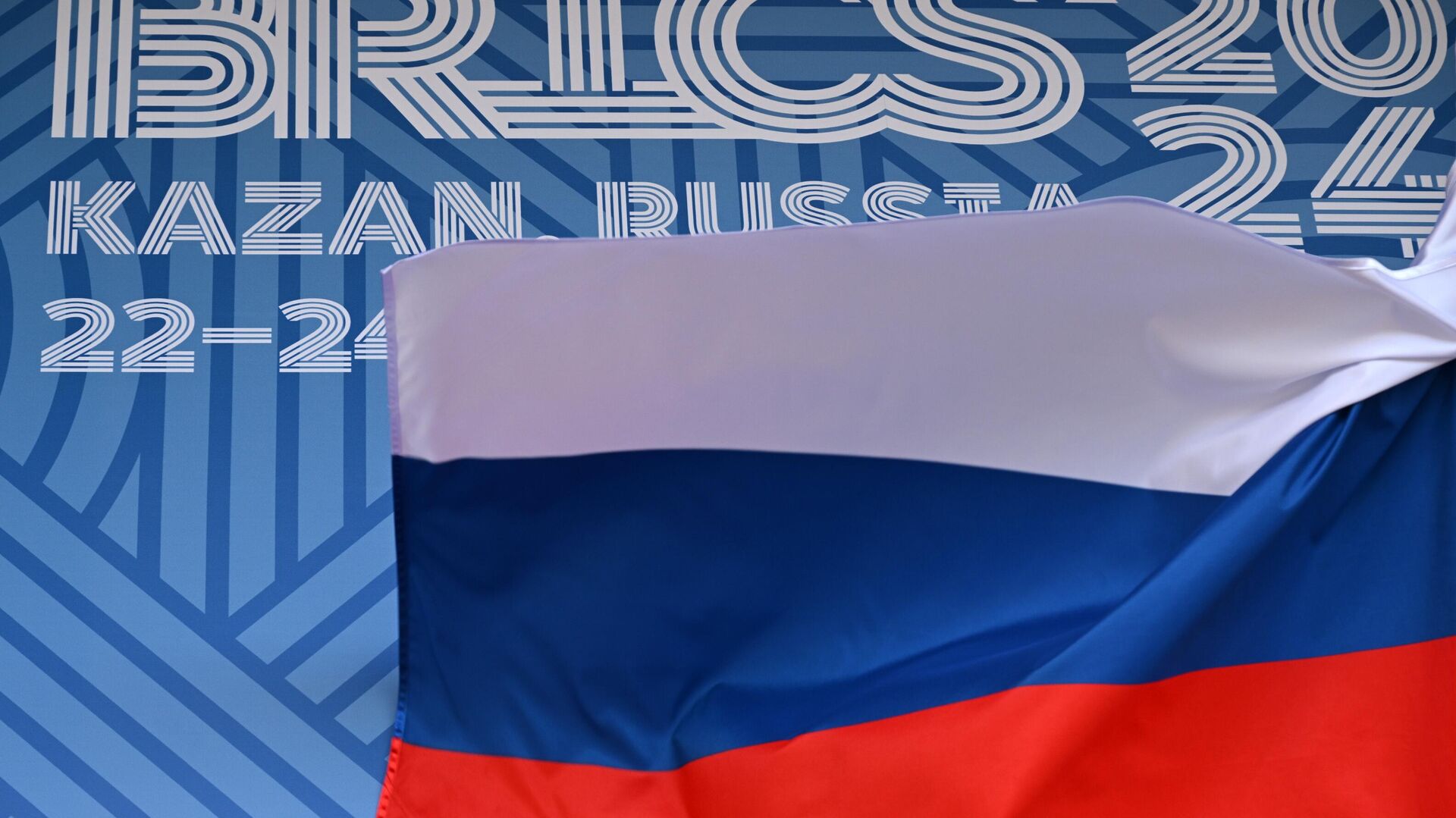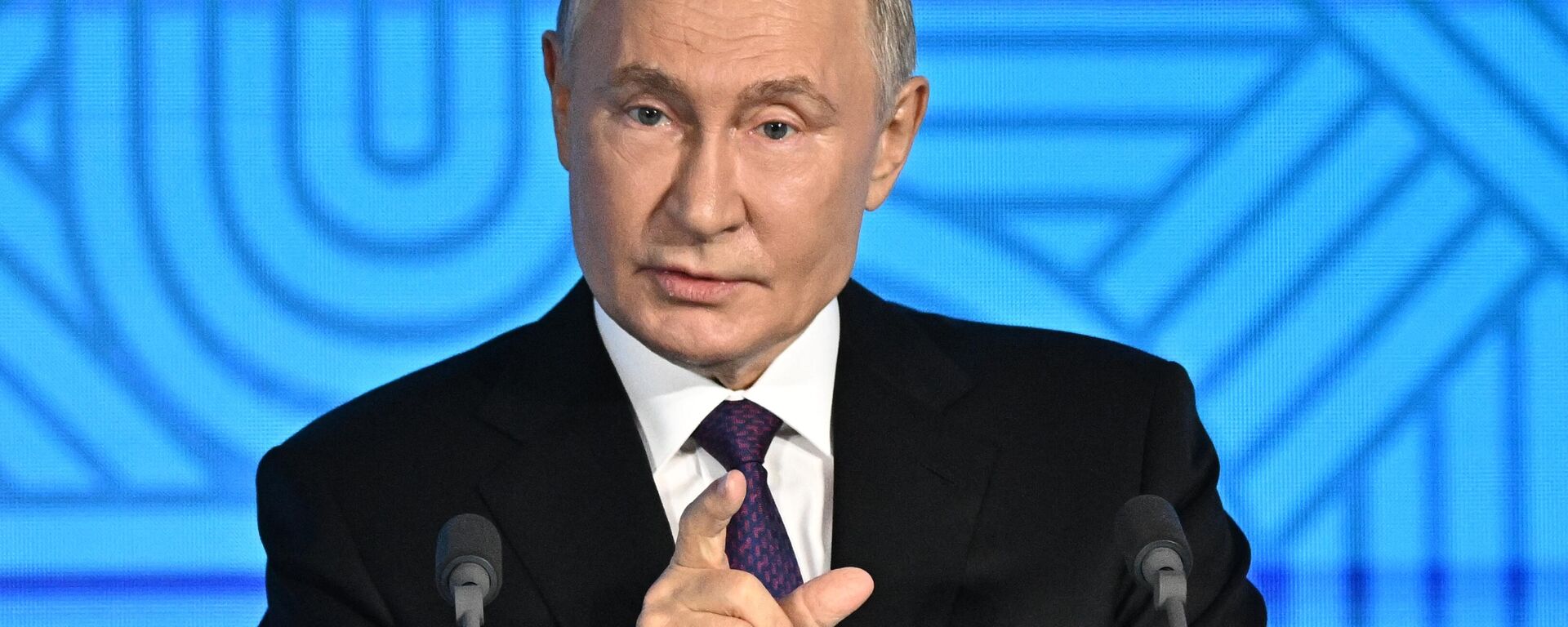https://en.sputniknews.africa/20241019/earth-shaking-transition-brics-lays-ground-for-new-multipolar-world-says-nigerian-broadcaster-1068769976.html
'Earth-Shaking Transition': BRICS Lays Ground for New Multipolar World, Says Nigerian Broadcaster
'Earth-Shaking Transition': BRICS Lays Ground for New Multipolar World, Says Nigerian Broadcaster
Sputnik Africa
Emerging political discussions about a new multipolar world revolve around the idea that global power is increasingly distributed among multiple nations rather... 19.10.2024, Sputnik Africa
2024-10-19T16:45+0200
2024-10-19T16:45+0200
2024-10-21T12:37+0200
opinion
africa insight
brics
de-dollarization
nigeria
west africa
kazan
brics summit 2024
economy
neocolonialism
https://cdn1.img.sputniknews.africa/img/07e8/0a/13/1068770311_0:134:3167:1915_1920x0_80_0_0_d5bedcc5f82906635d8ee755b6bc6f1b.jpg
The world is shifting from a unipolar to a multipolar international order, with BRICS playing a pivotal role in reshaping global dynamics, Dr. Is'haq Modibbo Kawu, a renowned Nigerian broadcaster, political scientist, and former Director General of Nigeria's National Broadcasting Commission, told Sputnik Africa.He underscored how the BRICS nations, led by Russia, China, India, Brazil, and South Africa, are creating a new international economic framework that fosters growth for developing nations, especially in Africa.He emphasized the importance of this change in history, remarking that the BRICS New Development Bank is emerging as a key tool in the global development landscape.For Africa, this transition represents a unique opportunity to break free from the legacies of imperialism, colonialism, and neocolonialism.The scientist also expressed optimism about the BRICS-led de-dollarization process, which he believes is crucial for safeguarding the economies of non-Western nations.Looking ahead, Kawu views BRICS as a platform for Africa’s industrialization and economic growth, particularly through collaboration with initiatives like the African Continental Free Trade Area.
https://en.sputniknews.africa/20241018/brics-new-development-bank-is-alternative-to-western-financial-mechanisms-putin-states-1068749443.html
nigeria
west africa
kazan
africa
Sputnik Africa
feedback@sputniknews.com
+74956456601
MIA „Rossiya Segodnya“
2024
Christina Glazkova
https://cdn1.img.sputniknews.africa/img/07e7/0b/07/1063380906_0:0:673:674_100x100_80_0_0_79628b4d0cd9f29291a57aa13bbf9e7a.jpg
Christina Glazkova
https://cdn1.img.sputniknews.africa/img/07e7/0b/07/1063380906_0:0:673:674_100x100_80_0_0_79628b4d0cd9f29291a57aa13bbf9e7a.jpg
News
en_EN
Sputnik Africa
feedback@sputniknews.com
+74956456601
MIA „Rossiya Segodnya“
Sputnik Africa
feedback@sputniknews.com
+74956456601
MIA „Rossiya Segodnya“
Christina Glazkova
https://cdn1.img.sputniknews.africa/img/07e7/0b/07/1063380906_0:0:673:674_100x100_80_0_0_79628b4d0cd9f29291a57aa13bbf9e7a.jpg
africa insight, brics, de-dollarization, nigeria, west africa, kazan, brics summit 2024, economy, neocolonialism, colonialism, africa, industrialization, african continental free trade area (afcfta)
africa insight, brics, de-dollarization, nigeria, west africa, kazan, brics summit 2024, economy, neocolonialism, colonialism, africa, industrialization, african continental free trade area (afcfta)
'Earth-Shaking Transition': BRICS Lays Ground for New Multipolar World, Says Nigerian Broadcaster
16:45 19.10.2024 (Updated: 12:37 21.10.2024) Christina Glazkova
Writer / Editor
Emerging political discussions about a new multipolar world revolve around the idea that global power is increasingly distributed among multiple nations rather than dominated by a single superpower or a few Western countries. This shift is largely driven by the rise of the Global South countries and organizations such as BRICS.
The world is shifting from a unipolar to a multipolar international order, with
BRICS playing a pivotal role in reshaping global dynamics,
Dr. Is'haq Modibbo Kawu, a renowned
Nigerian broadcaster, political scientist, and former Director General of Nigeria's National Broadcasting Commission, told
Sputnik Africa.
He underscored how the BRICS nations, led by Russia, China, India, Brazil, and South Africa, are creating a new international economic framework that
fosters growth for developing nations, especially in Africa.
“There is no doubting the words of President Vladimir Putin. The world is in a truly earth-shaking transition from a unipolar world to the new reality of a multipolar international order,” Kawu said, emphasizing that the BRICS countries are not only outpacing global GDP growth but are also positioning themselves as the main drivers of global economic development.
He emphasized the importance of this change in history, remarking that the BRICS New Development Bank is emerging as a key tool in the global development landscape.
For Africa, this transition represents a unique opportunity to break free from the legacies of imperialism,
colonialism, and neocolonialism.
“Africa in particular, and the developing countries in general, have always possessed remarkable potential [...]. What has hobbled African development has been the imperialist domination rooted in slavery, colonialism, and the neocolonial processes that followed the achievement of independence,” Kawu stressed.
The scientist also expressed optimism about the
BRICS-led de-dollarization process, which he believes is crucial for safeguarding the economies of non-Western nations.
“As things stand today, every non-Western country can be economically blackmailed; their economies can be held hostage, and this is not healthy for the contemporary world,” he remarked, referring to the impact of Western sanctions on Russia.
Looking ahead, Kawu views BRICS as a platform for
Africa’s industrialization and economic growth, particularly through collaboration with initiatives like the African Continental Free Trade Area.
“For the African peoples, BRICS is a potential platform of partnership that can assist Africa's industrialization and general growth,” he concluded, noting the enthusiastic attention the BRICS summit in Kazan, Russia, has garnered across the continent.



